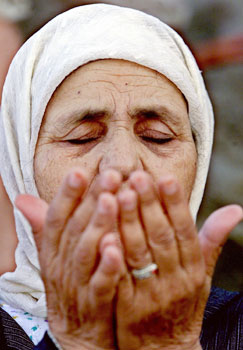Peoples and Cultures
Yezidis, Kurds and Zoroastrianism
Dr. Orville Boyd Jenkins
Question:
Are Kurdish people Zoroastrians? Because I came to know that many Kurdish peoples are still practicing Zoroastrianism and Avesta (sacred book of Zoroastrians) and celebrating Nouroze also as Zoroastrians do. — A Zoroastrian from Pakistan
Answer:
While I do not claim to be an authority on the many details of deep Kurdish culture, it would not surprise me if some Kurds still practice Zoroastrianism.
Navroze
Nouroze, or Navroze, however, is not limited to Zoroastrianism. This is the ancient cultural New Year celebration of the ancient Medo-Iranians. Various ethnic groups celebrate Navroze. Wikipedia's article on Navroz (Nawruz) points out other religious groups also observe Navroze:
As well as being a Zoroastrian holiday, it is also a holy day for adherents of Sufism as well as Bahá'í Faith. ... Shia Nizari Ismaili muslims, who trace their origins to Iran, celebrate the festival under the name Navroz. -- "Navroz," Wikipedia
One authority indicates that this observance of the first day of spring was an old Assyrian practice that persisted into modern time in Egypt and was transported to Persia from Egypt by the Fatimid Kings when they took over Persia.
It derives from ancient observances similar to New Year celebrations of other ancient Indo-European peoples. I cannot comment on the role of the Avesta scriptures or practices among Kurd-related ethnic groups.
|
Yezidi
I am familiar with aspects of Zoroastrianism in the religious movement called Yezidism, which some Yezidis and non-Yezidis associate with the broader Kurdish culture group. As discussed in my article Yezidis, an Angelic Sect, some Yezidis and non-Yezidis include the Yezidi community in the Kurdish sphere. Others do not.
It is possible that the Zoroastrian practices associated with the Kurdish group of ethnicities is actually the Yezidi communities we are discussing. The Yezidis use the Avesta and celebrate Navroze. Some sects are apparently closer to Parsee Zoroastrianism than others.
Renewed Interest
In recent years there has been a renewed interest in Zoroastrianism, and an attempt by Parsees and others to promote it. One result of this is to try to find all possible people or groups that might follow the Avesta-based religious followers. It appears that some of the numbers and persons counted as Zoroastrians would strictly be Yezidis.
Yezidis and Kurds
Your personal knowledge of Kurds who claim to be Zoroastrians might indicate that Yezidis are identifying more strongly with the main Zoroastrian line. It might also indicate that some Kurds have chosen to follow more traditional Zoroastrian practices and identities.
We have seen also that there are differences within the Yezidi community about whether they identify as Kurds or not. I know there has been a move away from Islam as part of the Kurdish attempt to increase their ethnic identity. Likewise the trend among Yezidis seems to be to heighten their uniqueness. But the Kurds themselves have for centuries been a multi-religious people.
They can be viewed in various ways. This is why there is such difference between sources in their listing of the Kurds and Kurd-related groups. You can categorize by religion, by ethnic heritage, by language currently spoken, by geographical or political distribution.
|

|
Cultural Renaissance
I understand that the Old Medians as well as Persians have celebrated Navroze from the earliest history we know. Thus it would not be surprising to find various peoples descended from those peoples still celebrating that festival.
The general rise in interest in cultural histories would also raise interest in Navroze and other traditional cultural celebrations as well as religious practices even among people who had not traditionally kept these practices over the centuries.
Related articles on this Website
![[TXT]](../graphics/text.gif) The Kurdish Peoples
The Kurdish Peoples
![[TXT]](../graphics/text.gif) The Kurdish Peoples
The Kurdish Peoples
![[TXT]](../graphics/text.gif) Qizilbash: Names and Designations in Ethno-Religious Identities
Qizilbash: Names and Designations in Ethno-Religious Identities
![[TXT]](../graphics/text.gif) The Rough Edges of Ethnicity
The Rough Edges of Ethnicity
![[TXT]](../graphics/text.gif) Yezidis, an Angelic Sect
Yezidis, an Angelic Sect
On My Blog
![[blog]](../graphics/bblogger.ico) Christians and Other Minorities Under Fire in Iraq
Christians and Other Minorities Under Fire in Iraq
More on Navroz
Jamshed-e-Navroz — ILoveIndia.com
Jamshedi Navroze — Parsi Khabar
My new year is yours — Kurds and Afghans Celebrate Navroze
Navroz — amana.org
Navroz Message for the Aga Khan — Salman Spiritual
Navroze: Noruz: Nowroj: What’s in a name?
Nawruz — Wikipedia
Navroze: Noruz: Nowroj: What’s in a name?
Zoroastrian Association of Greater New York
More on Zoroastrianism
Avesta — Zoroastrian Archives
World Zoroastrian Association
OBJ
Originally written 20 June 2003 in an email response to a reader
Finalized as article and posted on OJTR 11 January 2008
Last edited 3 February 2014
Orville Boyd Jenkins, EdD, PhD
Copyright © 2007 Orville Boyd Jenkins
Permission granted for free download and transmission for personal or educational use. Please give credit and link back. Other rights reserved.
filename: yezidikurdzoroastrianism.html

![[TXT]](../graphics/text.gif)